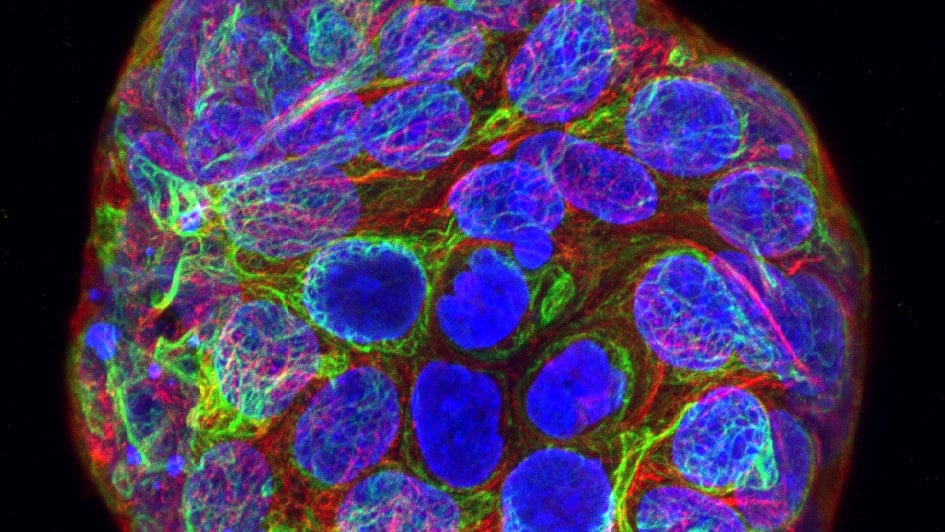
Image: KRAS-mutated cancer cells. Credit Lisa Pickard / Louise Howell / ICR
Researchers are set to to combine expertise in drug discovery, artificial intelligence (AI), and experimental cancer models and platforms in a new programme to design the precision cancer drugs of the future.
Under an academic and commercial collaboration between The Institute of Cancer Research, London, the Bellvitge Biomedical Research Institute (IDIBELL), Barcelona, and the company Vivan Therapeutics, a multi-disciplinary team will seek to create drugs that can counteract drug resistance.
Drug resistance – where cancer adapts, evolves and becomes resistant to treatment – is one of the biggest challenges in cancer research. Although a drug targeted at a specific weakness in a person’s cancer may initially be effective at stopping cancer growth, their tumour may develop resistance over time.
The team will have a particular focus on creating drugs that could target KRAS, a notorious cancer-driving protein. Few currently approved drugs target KRAS, and patients usually become resistant within months to those that are available.
Scientists at The Institute of Cancer Research (ICR) led by Professor Paul Workman, a world leader in the discovery of small-molecule cancer drugs, and Dr Albert Antolin at IDIBELL, who is developing new strategies based on Big Data and AI to power drug design, will work with Vivan Therapeutics to create new, more effective targeted cancer drugs that could be less prone to the problem of resistance.
The ICR is one of the UK's leading higher education institutions in industry collaboration.
Find out more
Combining expertise
The research team aims to design and develop small molecules that could simultaneously target multiple weaknesses in cancers with faults in KRAS.
Vivan Therapeutics has developed a collection of fruit fly models that have faults in KRAS, either alone or in combination with other gene faults that drive cancer growth. The company has also developed a technology platform to enable testing of cancer therapies at a high-throughput level.
Dr Antolin will use sophisticated new computational methods to identify promising compounds that could target both KRAS and other cancer-driving proteins.
Professor Workman will bring his extensive experience in drug discovery, and potentially test small molecules discovered in this project on cancer cells in his laboratory before testing the most promising compounds in fly models developed by Vivan.
The team’s ultimate goal is to find compounds that can effectively slow the growth of cancer in selected fly models, which could then progress onto the next stage of drug discovery and development.
Professor Paul Workman, Group Leader of the Signal Transduction and Molecular Pharmacology Team at the ICR, said:
“I’m very much looking forward to working with the teams at IDIBELL and Vivan. Our goal is to find safe and effective new drugs that are less likely to evoke resistance than current drugs, by targeting multiple weaknesses in cancer at once – and that ultimately benefit cancer patients by giving them new treatment options that last longer than those that are currently available.”
Dr Albert Antolin, principal investigator at IDIBELL, said:
“I am really excited about this multi-disciplinary, industry-academia collaboration because the partners bring in very different and complementary expertise to tackle an important challenge that could make a big difference to many patients with cancers that harbour KRAS mutations.”
Laura Towart, CEO of Vivan Therapeutics said:
“We are thrilled to work with the Antolin and Workman labs to pioneer new therapies for hard to treat cancers. We utilise our in vivo high throughput drug screening platform to identify combinations of approved drugs to personalise patient treatment today but we are also committed to developing therapies of the future.”